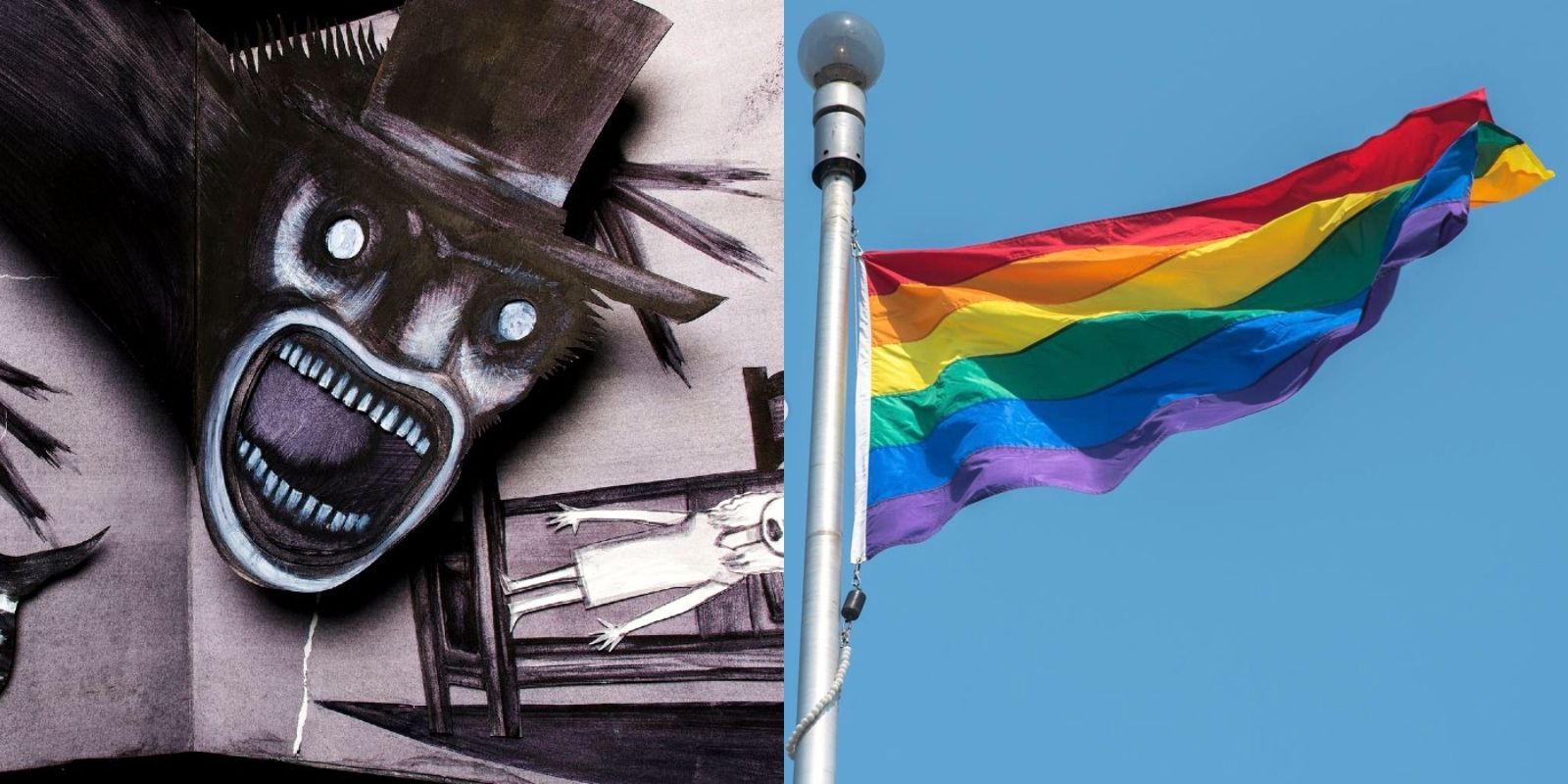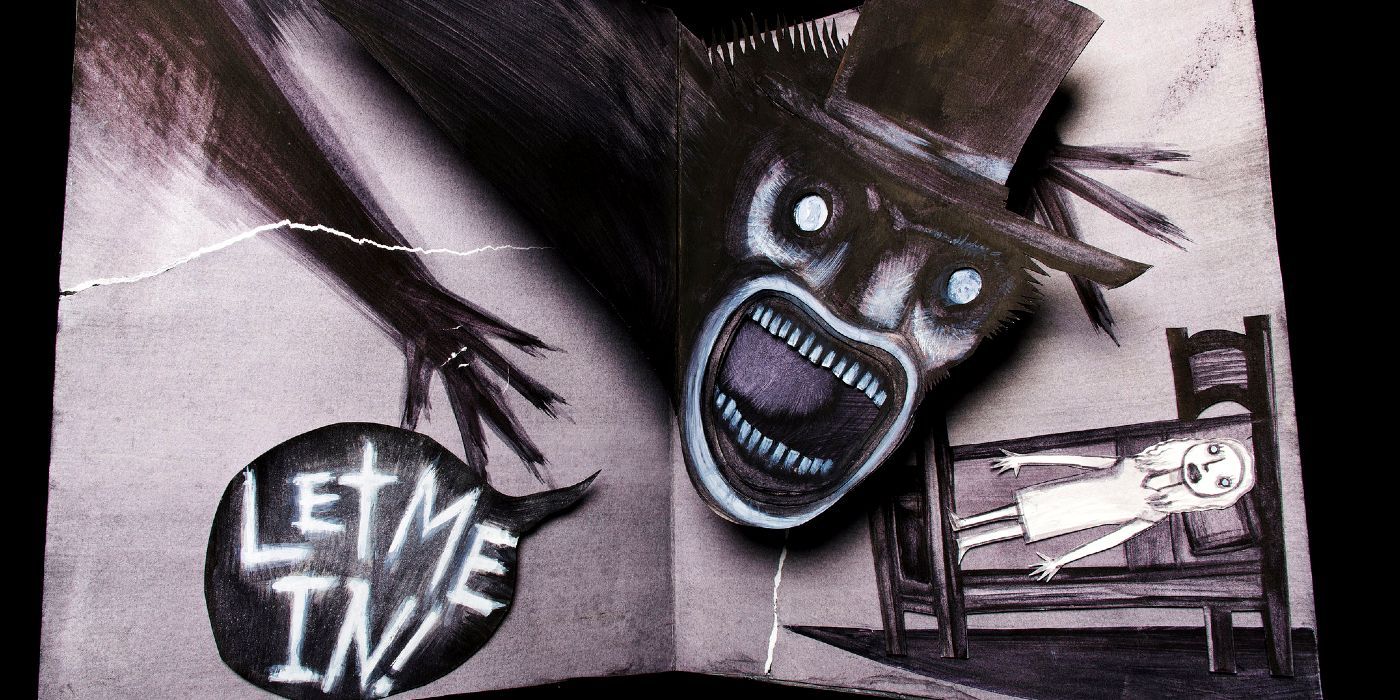An Australian horror film released in 2014 called The Babadook has already gone through all levels of transformation despite only being out for seven years. At first, it wasn't a massive commercial success but it was highly acclaimed by critics and horror fans, and it now lives as a classic after being put on many streaming services for home release. Something else that helped the film become a household name was a really interesting internet journey The Babadook and its lead antagonist, Mister Babadook, took to achieving LGBTQ+ icon status.
The actual film doesn't have any overt LGBTQ+ themes. It's about a woman named Amelia who is a single mother to her son Sam. One night Sam picks a strange book for Amelia to read to him as a bedtime story. It's called "Mister Babadook" and as Amelia reads it, she realizes that the book is very dark and not child-friendly. Afterward, strange things start to happen to the pair and Mister Babadook is suspected to be acting sinister in their real life.
It's a horror film, but most of the scary and disturbing aspects come from emotional parts of the movie, and it leans heavily into drama. The main themes of the story seem to revolve around family and the trauma that can come from family, as well as an obvious one being grief and how that affects a person's mental state. Others, however, have said they identify with the film in relation to their experiences with eating disorders, addiction, and even being LGBTQ+.
The LGBTQ+ Babadook comparisons started two years after the film was released in October of 2016, and of course, it all began with a Tumblr post that is kind of read as a joke. A user posted “Whenever someone says the Babadook isn’t openly gay it’s like?? Did you even watch the movie???” and it received tens of thousands of reblogs and likes. It then became even more of a thing, when someone posted a picture of their Netflix home page that featured The Babadook in its LGBTQ+ section. This wasn't verified to be true, and very well could have been edited, but it still went viral. All of this was amplified when a writer named Ryan Broderick started tweeting about the meme, talking about what he called "Babadiscourse" that was happening on Tumblr.
Much of the "Babadiscourse" was full of jokes and trolling. People claimed Mister Babadook was gay because of his flamboyant appearance and top hat, and because he's dramatic. They also discuss how Mister Babadook is a dark secret that terrorizes a family, and specifically a mother. The implications of that might sound bad, and it's because they're heavy implications, but it's not an unrealistic thing. If there is an LGBTQ+ person in a family that isn't wholly accepting of it, there can be a lot of drama and stress. That's just the unfortunate truth.
These more heavy and sad implications of Mister Babadook are where the jokes have kind of stopped and some LGBTQ+ people have formed more real connections to their lives and experiences. While a lot of the discourse still remained kind of silly, and very much an internet meme, there was a community that discussed how they did relate their queerness to the film. The aspects that involve something hiding inside someone and engulfing them were relatable to people who have struggled with their gender or sexuality and were/are closeted for a long time.
The aforementioned stress that it can cause a mother, or a whole family, when the truth does come out and it's maybe harder for them to accept or they plainly don't want to accept it. Even though this seemingly originated as a joke, there were so many valid points that came out of this analysis of the character and the film. Mister Babadook had officially become a queer icon, and the LGBTQ+ community ran with it.
Since all of this happened, Mister Babadook has just been wholly accepted as a symbol for LGBTQ+ rights. Throughout June, which is Pride Month, many theaters do showings of the film, especially in Los Angeles. At Pride parades and celebrations around the world, it's not uncommon to see people in Mister Babadook cosplay or carrying flags and signs with the character on them. Ultimately, it's entirely possible that this will be what The Babadook and Mister Babadook are most remembered for and after a few generations have passed, people might not even give it a second thought.
While Jennifer Kent, the director of The Babadook, has confirmed that the film was not intended to be an LGBTQ+ themed film, she has also given her blessing for people to take it that way. Similarly to how Romero didn't intend for Night of the Living Dead to be a film about racism, people took it that way and identified with it for that reason. It sparks the conversation of whether the creators' intent truly matters at all, or if it all comes down to what the audience feels from the films they consume. It's certainly something to think about, and could probably cause a few online debates, but there's little people can do once a fandom takes something on and make it their own.


